unit1 the written word——task 1教学设计 高中英语(江苏)复习专题
牛津译林版高中英语模块8 Unit 1 The written word Task 教学设计

Unit 1 The written word Task 教学案Skills building 1: Listening for key wordsFirst, I’m going to summarize what I read. So please listen to me attentively, paying special attention to the emphasized key words.Just as a proverb says, ‘Life is filled with twists and turns.’ One can’t gain any success if he or she never experiences difficulty or failure. In other words, trouble exists from beginning to end during our lifetime. Students may fail in their exams, scientists may fail in their experiments, and players may be defeated in their matches.Discuss in pairs: While listening to a lecture or a news report, do you always have to pay attention to every word the speaker uses?What do you think are the most important words to pay attention to?Why do you think so?Read the guidelines in Skills building 1 on Page 10. Try to give a speech,following the guidelines.Step 1: recognizing key words1. Suppose in your English class,your teacher is telling you how to write a literary review. Now listen to this speech,trying to fill the table in Part A on Page 10.2. Listen to the tape again,and check the answers.3. What role do you think friendship plays in our daily life?Now,let’s read a short story. After that,you may get a better understanding of friendship.4. Read the story again and then complete the table with the key words in the short story.。
牛津译林版高中英语模块8 Unit 1 The written word Project 教学设计

Unit 1 The written word Project 教学案Part A: ReadingAt the beginning of this period, let’s enjoy an English poem. She walks in beauty. Look at the screen and listen to the tape, trying to grasp the theme of the poem.It’s a romantic poem. As we all know, romantic themes tend to be emotional. Today, we’ll read and later recite a romantic poem about Love by Robert Burns A Red, Red Rose. Let’s come to the reading part of Project.1. Read the report on the poetry of Robert Burns, skim for the main idea of this article and tell how it is organized.Paragraphs 1—4 introduction of Robert BurnsParagraphs 5—7 some information about a movement of poets called the Romantic Movement Paragraphs 8—9 the poem ‘A Red,Red Rose’ with its introduction and explanation2. Pair work: Rearrange the events in the order of time. Fill in the following table:3. Read the article for a third time to get more information about this report,and then fill in the following table about Robert Burns.4. Read and recite the poem A Red,Red Rose,trying to understand the meaning of the poem.Part B1. Group work: Discuss the eight questions in Part B. Then prepare your project.2. Present your project.Homework1. Read the passage in project and recite the poem.2. Do Parts B1 and B2 on page 101 of the Workbook.。
牛津译林版高中英语选修八《Unit 1 The written word》task 教案 1

牛津译林版高中英语选修八Skills building 1: completing a quizIn a quiz, we are usually asked to answer some questions. What should we do when we take a quiz and what steps we should take to make sure that we answer the questions correctly? Let’s read the guidelines and the three steps on our books. After that you will have a chance to complete a quiz about the film industry.Step 1: completing a quiz about the film industryThis part is designed to help you develop your listening skills. You will listen to two radio programmes discussing the early days of film, and then read a web page about film facts. You are expected to use all of the information to complete a film quiz. Before listening, you can look through the questions first.TapescriptHost: Today on History’s Greatest Inventions, we are discussing films, which were once called ‘moving pictures’!Guest: Well, that isn’t such a strange name. That’s what films are——moving pictures. What our eyes see as movements are really just the small differences between thousands of still photographs.Host: Really?Guest: Yes, every film is made of frames, and each frame is just a photograph. We first started viewing them as connected films back in the 1880s. William Friese-Green was the first man to record and then play back what we now think of as a film. He made his film in Hyde Park, London, and later watched it in his home. On the twenty-eighth of December eighteen ninety-five, two Frenchmen, the Lumière brothers, made a film and presented it to pay ing audiences. They are often considered the ‘fathers of the modern film industry’Host: These first films were not like the ones we see today, were they?Guest:No. One big difference is the speed of the filming—at first, cameras were operated by hand, and it was hard to keep the film moving at the same speed all the time. When we see these old films today, the actors look like they are moving too fast. Another big difference is that old films had no sound. We now refer to them as silent films. When people went to see them, there would be a piano player, or even an orchestra in the theatre to provide music. The first ‘talking film’ or film with sound was shown in New York in nineteen twenty-seven. It was called The Jazz Singer. The first words ever heard in a film were, ‘wait a minute. Wait a minute. You ain’t heard nothin’yet.’ Audiences were so excited they even stood up in the theatre and applauded!One other thing you will notice if you watch an older film is that they were all in3. Listen to another radio programme in Part B. This time you will listen to some information about Hollywood, and you can use the information to answer some of the remaining questions onafter listening to the recording in this part.This part is designed to help you pay attention to the words or information emphasized in a question to answer it exactly. In the Grammar and usage section of this unit, we learnt how to emphasize some parts of sentences by adding some words or using certain sentence structures. Are there any other ways that we can emphasize some words or information, especially when we are speaking? Sometimes we stress the words we want to emphasize. Now let’s go over Skills building 2.Step 2: asking and answering questions about Chinese filmsIn this part, you should work in pairs to conduct an interview about Chinese films. You are expected to practice the speaking skills you have learnt in Skills building 2.1. Go over the instructions so that you know what to do in Step2. Then read all the questions and answers and make sure that you know what you are going to do.2. Work in pairs to do this role-play activity, asking and answering questions about Chinese films. When asking questions, you should emphasize the words in bold. The student who is answering questions should repeat the emphasized words. After you finish asking and answering these questions, you should switch roles. In this way, every one of you will have a chance to practiceSkills building 3: using information from more than one sourceIn this part, you will learn what you need to do to prepare the information for a speech or an essay competition.T: What will you do before you attend a speech or an essay competition? Give as many answers as you can.S1: know what the subject of the competition isS2: find out different aspects of the subject and write the draftS3: do research on the aspects that you do not knowT: Review what you have learnt about the film industry in Steps 1 and 2. List the information you have already obtained, and think about what else you will need in making the speech or writing the essay for the competition. For example:● The information I have already got:the first film-maker/ fathers of modern film;where the first film was made;the first studio in Hollywood;the title of the first ‘talking film’;the title of the first film made in China;the differences between old and modern films● The information I need to do r esearch on:the titles of the best films in some famous film festivals this year;some famous actors/ actresses in Hollywood/ ChinaStep 3: writing a speech about the film industryNow you are required to write a speech using information gathered in the previous steps. Firstread the guidelines in Step 3 and find out what you are asked to do. Then work in groups to。
牛津高中英语模块八Unit1 The written word教学设计_徐申叶

English TeachersVol.15No.11一、Thoughts on the design牛津教材中的project 板块是为了引导学生进行探究性学习,把英语听、说、读、写的训练从课堂内拓展到课堂外;要求学生能够用英语创造性地完成学习任务,培养学生综合运用语言的能力。
本单元的主题是:Reciting a poem ,要求学生先学习了解苏格兰最著名的诗人罗伯特·彭斯的生平以及他的诗歌流派特色,然后再学习欣赏他的一首经典诗歌《一朵红红的玫瑰花》,帮助学生有感情地朗诵诗歌并掌握欣赏英文诗歌的技巧。
在此基础上,为了让学生学以致用,帮助学生拓展视野,可再让学生欣赏一首英文小诗。
二、Teaching aimsBy the end of the period ,students will be able to :a.get a brief idea of Robert Burns basic life experience and his writing style.b.know some basic information on poetry and learn to enjoy his famous poem and apply the basic knowledge of poetry to another modern poem.三、Teaching procedures Step 1:Lead inLet students enjoy a romantic English song with the lines from the poem :A Red ,Red Rose ,to lead to the topic of Scotland.Ask students to view part of a speech video made by the Prime Minister of the UK to arouse students interests in Scotland and the most important person in the UK so as to lead to the topic of the period :Robert Burns.【Explanation 】此设计的目的有两个:一是以英文歌曲和英国首相的演讲视频导入,作为学生听说的热身训练,以激发学生的课堂兴趣;二是主要突出本节课的主角Robert Burns ,他被称为最重要的苏格兰人。
高二英语精品教案:UnitThewrittenwordWelcometotheunit(牛津译林版)

Unit 1 The written wordWelcome to the unit-—-教案Aims and requirements♦ Discuss some classic literature and give your opinion on a literary review ♦ Write a literary review♦ Recite a poemProceduresStep 1:BrainstormingAs we all know,reading plays an important role in our daily life and we often have chances to appreciate good books。
They bring us pleasure as well as knowledge. So we’re always lost in good books,especially some world-famous works.Can you name some of the books you’ve read?Would you like to recommend your favorite book to your classmates?Picture talk:Picture 1:Our school will set up a new bookclub,are you willing to join it?What will you do in the book club?Suggested answers:—-— reading books together and then discuss them—--sharing information about books and authors---holding book fairsPicture 2 &3As students ,we can get close to all kinds of books. Among the following books which is your favourite? Or do you have another preference?As the development of technology, besides the traditional books, that is, books in print, do we have any other kinds of book?The e-books bring us a lot of convenience,now I’ll let every 2 students as a group ,and the advantages of e—book?Suggested answers:1。
高中英语:Unit 1《The written word》教案-Project(牛津译林版选修8)
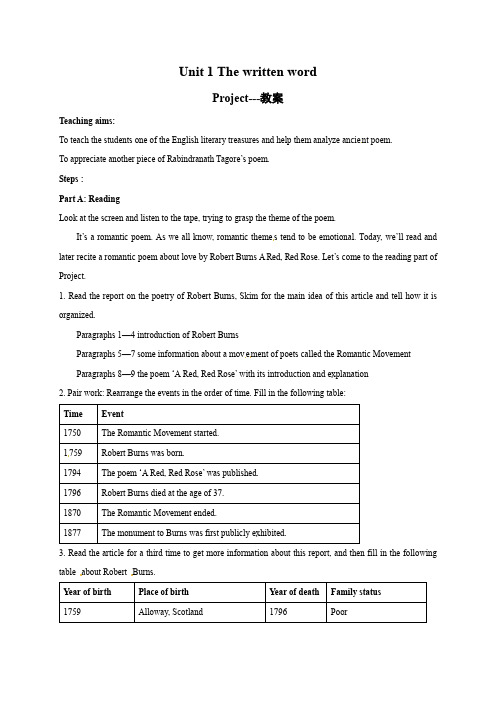
Unit 1 The written wordProject---教案Teaching aims:To teach the students one of the English literary treasures and help them analyze ancie nt poem.To appreciate another piece of Rabindranath Tagore’s poem.Steps :Part A: ReadingLook at the screen and listen to the tape, trying to grasp the theme of the poem.It’s a romantic poem. As we all know, romantic theme s tend to be emotional. Today, we’ll read and later recite a romantic poem about love by Robert Burns A Red, Red Rose.Let’s come to the reading part of Project.1. Read the report on the poetry of Robert Burns, Skim for the main idea of this article and tell how it is organized.Paragraphs 1—4 introduction of Robert BurnsParagraphs 5—7 some information about a mov e ment of poets called the Romantic MovementParagraphs 8—9 the poem ‘A Red, Red Rose’ with its introduction and explanation2. Pair work: Rearrange the events in the order of time. Fill in the following table:Time Event1750 The Romantic Movement started.1759 Robert Burns was born.1794 The poem ‘A Red, Red Rose’ was published.1796 Robert Burns died at the age of 37.1870 The Romantic Movement ended.1877 The monument to Burns was first publicly exhibited.3. Read the article for a third time to get more information about this report, and then fill in the following table about Robert Burns.Year of birth Place of birth Year of death Family status1759 Alloway, Scotland 1796 PoorHis first love NameNelly KirkpatrickEffect on him Encouraged him to start writing po etry Main works ‘To a Mouse’; ‘The Holy Fair’; ‘A Red, Red Rose’The movement of poets Name of the movement Romantic MovementRepresentative poets John Keats; William Wordsworth; Robert Burns Features Romantic themes tend to be more emotional.The poems are always about lo ve, dreams or nature.The way people memorize him *All of Scotland mourned his death, and afterwards many people donated money to support his widow and children. The monument to him was first publicly exhibited in 1877 and about 30,000 people attended the first exhibition. *The house in Alloway, where Burns was born, is now a museum of his life and work.4. Read and recite the poem A Red, Red Rose, trying to u nderstand the meaning of the poem.5. poem appreciation: by Rabindranath TagoreThe Furthest Distance in the worldThe furthest dis tance in the worldIs not between life and deathBut when I stand in front of youYet you don't know thatI love you.The furthest distance in the worldIs not when I stand in front of youYet you can\'t see my loveBut when undoubtly knowing the love from bothYet cannot be together.The furthest distance in the worldIs not being apart while being in loveBut when I plainly cannot resist the yearningYet pretending you have never been in my heart.The furthest distance in the worldIs not struggling against the tidesBut using one\'s indifferent heartTo dig an uncrossable riverFor the one who loves you .Part B1. Group work: Discuss the eight questions in Part B. Then prepare your project.2. Present your project.Homework1. Read the passage in project and recite the poem.2. Do Parts B1 and B2 on page 101 of the Workbook.。
牛津高中英语模块八Unit1 The written word教学设计

牛津高中英语模块八Unit1 The written word教学设计
徐申叶
【期刊名称】《英语教师》
【年(卷),期】2015(015)011
【摘要】牛津教材中的project板块是为了引导学生进行探究性学习,把英语听、说、读、写的训练从课堂内拓展到课堂外;要求学生能够用英语创造f生地完成学习任务,培养学生综合运用语言的能力。
本单元的主题是:Recitingapoem,要
求学生先学习了解苏格兰最著名的诗人罗伯特·彭斯的生平以及他的诗歌流派特色,然后再学习欣赏他的一首经典诗歌《一朵红红的玫瑰花》,帮助学生有感『青地朗诵诗歌并掌握欣赏英文诗歌的技巧。
在此基础上,为了让学生学以致用,帮助学生拓展视野,可再让学生欣赏一首英文小诗。
【总页数】2页(P75-76)
【作者】徐申叶
【作者单位】江苏省苏州工业园区星海实验中学,江苏苏州215021
【正文语种】中文
【中图分类】G633.41
【相关文献】
1.牛津高中英语模块八Unit 1 The written word教学设计 [J], 徐申叶
2.牛津高中英语模块一Unit1 Word power教学设计 [J], 曹春芳
3.注重语篇分析,培养阅读能力——以牛津高中英语模块三Unit1 The world of
our senses中Reading部分“Fog”为例 [J], 郭夕盛;
4.应用语篇分析,提升阅读能力——以牛津高中英语模块8 Unit 1 The written world为例 [J], 杨兴才;
5.牛津高中英语模块一Unit 1 Word power教学设计 [J], 曹春芳;
因版权原因,仅展示原文概要,查看原文内容请购买。
全套教案-牛津英语模块八第一单元Module8Unit1教案
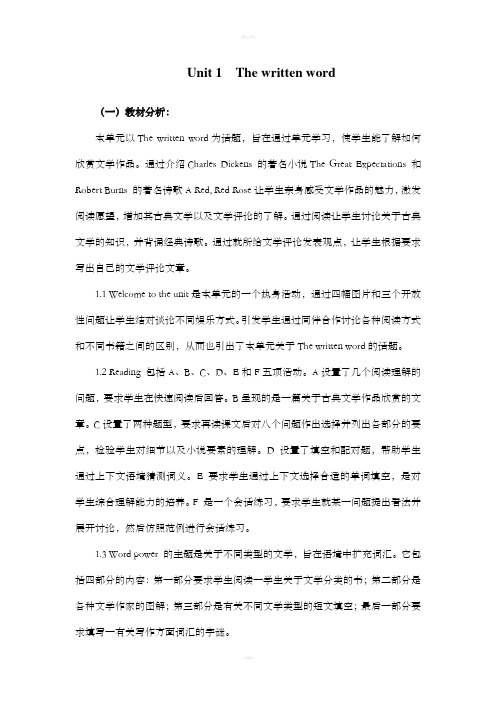
Unit 1 The written word(一)教材分析:本单元以The written word为话题,旨在通过单元学习,使学生能了解如何欣赏文学作品。
通过介绍Charles Dickens 的著名小说The Great Expectations 和Robert Burns 的著名诗歌A Red, Red Rose让学生亲身感受文学作品的魅力,激发阅读愿望,增加其古典文学以及文学评论的了解。
通过阅读让学生讨论关于古典文学的知识,并背诵经典诗歌。
通过就所给文学评论发表观点,让学生根据要求写出自己的文学评论文章。
1.1 Welcome to the unit是本单元的一个热身活动,通过四幅图片和三个开放性问题让学生结对谈论不同娱乐方式。
引发学生通过同伴合作讨论各种阅读方式和不同书籍之间的区别,从而也引出了本单元关于The written word的话题。
1.2 Reading 包括A、B、C、D、E和F五项活动。
A设置了几个阅读理解的问题,要求学生在快速阅读后回答。
B呈现的是一篇关于古典文学作品欣赏的文章。
C设置了两种题型,要求再读课文后对八个问题作出选择并列出各部分的要点,检验学生对细节以及小说要素的理解。
D 设置了填空和配对题,帮助学生通过上下文语境猜测词义。
E 要求学生通过上下文选择合适的单词填空,是对学生综合理解能力的培养。
F 是一个会话练习,要求学生就某一问题提出看法并展开讨论,然后仿照范例进行会话练习。
1.3 Word power 的主题是关于不同类型的文学,旨在语境中扩充词汇。
它包括四部分的内容:第一部分要求学生阅读一学生关于文学分类的书;第二部分是各种文学作家的图解;第三部分是有关不同文学类型的短文填空;最后一部分要求填写一有关写作方面词汇的字谜。
1.4 Grammar and usage 总结了否定句的分类、用法、构成和意义,并通过相关练习题帮助学生巩固对这种语法的掌握。
1.5 Task的主要任务是写出一文学评论文章,其中包含了3种技巧并分别设计了三个步骤帮助学生掌握这些技巧:第一了解听关键词找信息的方法;第二询问并发表观点;第三如何写文学评论文章。
高二下册Module 8《Unit1 The written world》word教学设计方案(牛津译林)教案
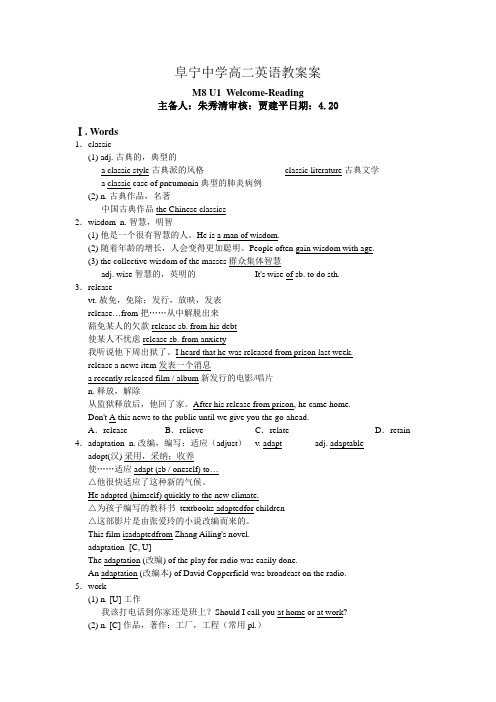
阜宁中学高二英语教案案M8 U1 Welcome-Reading主备人:朱秀清审核:贾建平日期:4.20Ⅰ. Words1.classic(1) adj. 古典的,典型的a classic style 古典派的风格classic literature 古典文学a classic case of pneumonia 典型的肺炎病例(2) n. 古典作品,名著中国古典作品 the Chinese classics2.wisdom n. 智慧,明智(1) 他是一个很有智慧的人。
He is a man of wisdom.(2) 随着年龄的增长,人会变得更加聪明。
People often gain wisdom with age.(3) the collective wisdom of the masses 群众集体智慧adj. wise 智慧的,英明的It's wise of sb. to do sth.3.releasevt. 赦免,免除;发行,放映,发表release…from 把……从中解脱出来豁免某人的欠款 release sb. from his debt使某人不忧虑 release sb. from anxiety我听说他下周出狱了。
I heard that he was released from prison last week.release a news item 发表一个消息a recently released film / album 新发行的电影/唱片n. 释放,解除从监狱释放后,他回了家。
After his release from prison, he came home.Don't A this news to the public until we give you the go-ahead.A.release B.relieve C.relate D.retain 4.adaptation n. 改编,编写;适应(adjust) v. adapt adj. adaptable adopt(汉) 采用,采纳;收养使……适应 adapt (sb / oneself) to…△他很快适应了这种新的气候。
高中英语 unit1 The written word教案 牛津译林版选修8-牛津版高二选修8英语教

M8 U1 The written wordWele to the unitTeaching aims:the students will enhance their skill of analyzing and solving problems.,the students will be able to collaborate with others.the students will be able to use persuasive remark to interact with others.the students will be able to talk about books.the students will be able to develop love and passion for literature.As we all know, reading plays an important role in our daily life and we often have chances to appreciate good books. They bring us pleasure as well as knowledge. So we’re always lost in good books, especially some world-famous works.Step 1: BrainstormingCan you name some of the books you’ve read?Would you like to remend your favorite book to your classmates?How do you entertain yourself?(Students)We surf the Internet, where guys could chat.I watch TV, where I can meet my favorite superstars.But I like reading science books which can bring me sense of success.As the matter of fact, listening to music I think is the best way to get entertained.We boys prefer Gameboys …Step 2: Sharing informationGroup work: Look at the four pictures at page 1. Le t’s study them one by one and try to discuss. The following questions might help you.(1) to find out why people write poems(2) to tell the differences between science fiction books and poetry (Teacher)I expect that we all take notes of what advice-providers are talking about. (Students)(1) People want to express what their feelings are. Or they believe poetry is beautiful, which could be appreciated by others.(2) In my opinion, there are many differences between poetry and science fiction. To begin with, poetry uses much more conciselanguage and specialwriting techniques like rhythm and rhyme. Next, poets often express their thoughts and feelings in poems, while science fiction writers often tell what may be possible in the future based on developments in science. Lastly, poems usually reflect life or society at specific times, while the main topics of science fiction books range from scientific discoveries, space travel, life on other planets to environmental changes.Step3: Discussion1.Do you think that e-books will replace books in print?2.What are some of the differences between poetry and science fiction books?As we could see, a lot of people enjoy reading books, which is why my friend Jack decided to work for a library. Therefore the book is at least as important as other media for entertaining, which can not be neglected. So when you are watching TV or chatting online, don’t forget we still have books to read, which could also entertain people.Step4: Homework1. Collect more information about literature.2. Prepare the Reading part.Reading Appreciating literatureTeaching aims:1. Students are expected to gain some knowledge about classic literature and someinsight into how to write an essay about literature;2. Students are expected to improve their reading skills by participating in the activities designed.Step1: Lead-inLet’s enjoy a section of film. Is it wonderful? Do you know something about the film?It’s based on Dickens’s famous novel“Oliver Twist”.It’s an example of classics. Cl assics are the antiques of the literary world. In this unit, we’ll have the chance to get more information about classic literature.Step 2: Fast reading for general ideasGo through the passage as quickly as possible and try to find answers to the three questions in part A on Page 2. Just focus on and identify the information needed to answer these questions.Reading strategy:1.What does a persuasive essay try to do?2. What’s the writer’s point of view in this essay?3. How does the author try to convince the reader?Key: 1. To convince the reader to adopt a certain point of view.2. To persuade us to appreciate classic literature.3. At the start, she asks us to change our minds about classic literature.Then she gives us interesting facts about Charles Dickens and his book,Great Expectations, which makes us want to read the book at the end of theessay.Step 3: Detailed reading for important information1.Let’s read the passage a second time and plete Parts C1 and C2 on page 4. Part one: Questions:1. Why don’t many people read t he classics?2. What does Liz think about classic novels?Multiple choice exercise (PPT18—20)Part two: Questions:1. When and where was Charles Dickens born?2. What books did he write?3. What is written on his gravestone (tomb)?Present brief introduction to Dickens and works by Charles Dickens.Part three: Questions:1. What are the main elements of a novel?2. What does Pip learn by the end of the novel?3. What’re the main elements(要素) to consider when reading a novel?4. What makes a good persuasive essay?Grammar and Usage否定表达英语否定概念的表达形式大致可以分为两大类——显形否定和隐形否定。
牛津译林版高中英语选修八unit 1the written wordread

单元:Unit 1 The written word板块:Reading 1Thoughts on the design:本教学方案分为四个部份,别离为lead-in、 reading comprehensi on、 post-reading activities 与 homework。
在lead-in环节,教师将要求学生讲述一些中外古典高作,尤其有关Charles Dickens 其相关高作的情形作为本课的开端,以增加其文学知识及激发其学习情趣。
在reading comprehension环节,教师将以快速读、细读等方式培育学生的阅读能力。
在post-reading 部份,设计讨论题对学生进行发散性思维的培育和巩固所学。
所有步骤通过PPT展示出来。
Teaching aims:1. Students are expected to gain some knowledge about classic literature and someinsight into how to write an essay about literature;2. Students are expected to improve their reading skills by participating in theactivities designed.Teaching procedures:Step 1 Lead- in:Before class, ask students to search on the Internet or in books about famous Chinese and foreign classic literature, Charles Dickens and his works. Ask students to focus on the followi ng questions:What is the definition of clas sic literature?What famous Chinese and foreign classic literature have you read?Who is Charles Dickens? What books did he write? ...Begin the class by having students report their findings to the class.Step 2 Reading comprehension:Fast reading:Ask students to skim the essay and try to find answers to the following three questions:1. What is classic literature?2. Who is Charles Dickens?3. Who is the main character in the novel Great Expectations?Answers:1. Classics are the antiques o f the literary world including no vels, plays andpoems that were written a long time ago and were so well written that people still read them today.2. Dickens is England’s g reatest writer.3. Pip is the main character in the novel Great Expectations.Step 3 Second reading for general ideas:Ask students to scan the essay and try to find out the structure of the text: Part one: information about _____________.Part two: information about __________.Part three: information about ________________________.Key: classic literature; Charles Dickens; the book Great expectationsStep 4 Reading strategy:1. What does a persuasive essay try to do?2. What’s the writer’s point of view in this essay?3. How does the author try to convi nce the reader?Key: 1. To convince the reader to adopt a certain point of view.2. To persuade us to appreciate classic literature.3. At the start, she asks us to change our minds about classic literature.Then she gives us interesting facts about Charles Dickens and his book,Great Expectations, which makes us want to read the book at the end of theessay.Step 5 Listening and further comprehension of each part:Part one: Questions:1. Why don’t many people read the classics?2. What does Liz think about classic novels?Multiple choice exercise (PPT18—20)Part two: Questions:1. When and where was Charles Dickens born?2. What books did he write?3. What is written on his gravestone (tom b)?Present brief introduction to Dickens and works by Charles Dickens.Part three: Questions:1. What are the main elements of a novel?2. What does Pip learn by the end of the novel?3. What’re the main elements (要素) to consider when reading a novel?4. What makes a good persuasive essay?Step 6 Post-reading activities:Discussion:Can you think of some possible endings for the novel?Consolidation1. 2 matching exercises. (PPT 33-34)2.Fill in the blanks with the following words. (PPT35-36)Step 7 Homework:1. R ead the text again and try to retell the story of Great Expectations.2. Think of some possible endings for the novel and write it down.。
牛津译林版高中英语模块8 Unit 1 The written word Reading 教学设计

Unit 1 The written word Reading 教学案Step 1: Lead-inLet’s enjoy a section of film. Is it wonderful? Do you know something about the film?It’s based on Dickens’s famous novel “Oliver Twist”. It’s an example of classics. Classics are the antiques of the literary world. In this unit,we’ll have the chance to get more information about classic literature.Step 2: Fast reading for general ideasGo through the passage as quickly as possible and try to find answers to the three questions in part A on Page 2. Just focus on and identify the information needed to answer these questions.Step 3: Detailed reading for important information1. Let’s read the passage a second time and complete Parts C1 and C2 on page 4.2. Listen to the tape and try to complete Part D and Part E.3. Read the text again and choose the best answers according to the text.1. Some people think that classics are old-fashioned because of the following statements except __________.A. they were written a long time ago.B. the language used in them is quite different from the language used today.C. they are difficult for people to understand.D. They can only be found in bookshops and libraries.。
Unit 1 The written word Word 教学设计新部编版
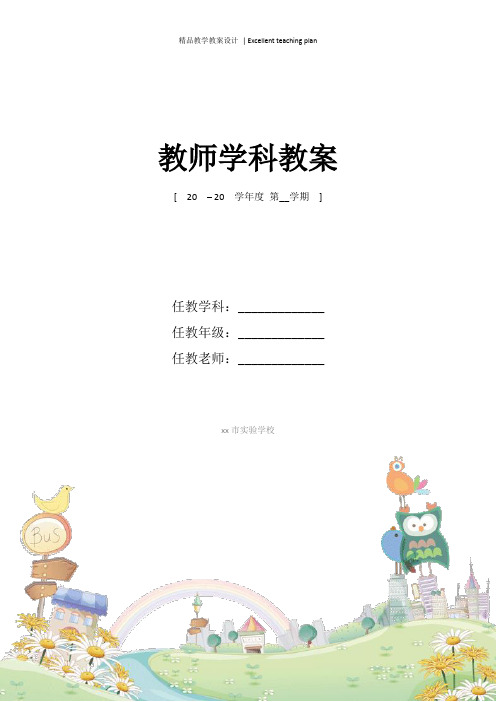
教师学科教案[ 20 – 20 学年度第__学期]任教学科:_____________任教年级:_____________任教老师:_____________xx市实验学校Unit 1 The written word Word 教学案2. Discussion:1) What are the differences between poetry and other forms of literature?2) How many categories of literature can you name?Step 2: Vocabulary learning1. Now,read the article about different categories of literature in Part A. Find out all the types mentioned in the text and then fill in the chart below.2. Now,please match each writer with his/ her masterpiece.“Miss Brill” Charles Dickens“Ode to a Nightingale”Katherine Mansfield“Romeo and Juliet”John Keats“Great Expectations”:William ShakespeareWould you choose one of the four famous literature figures and give an introduction to him or her?3. Now let’s come to Part C on page 7. Please finish it individually. You may use Parts A and B as reference.Step 3: Vocabulary extension1. Pair work: Complete Part D in pairs,you may consult a dictionary.2. Discussion: Who is your favorite literature figure and why?3. Reading:Good sentences taken from Oliver Twist1) “Please,Sir,I want some more.”… Oliver,asking the cook at the workhouse for more gruel.2) “Good-bye dear!God bless you!” …Dick told Oliver on his way to London,which warmed Oliver’ s heart and gave him courage.3) “As he spoke,he pointed hastily to the pict ure above Oliver’s head;and then to the boy’s face. There was its living copy. The eyes,the head,the mouth;every feature was the same. The expression was,for an instant,so precisely alike,that the minutest line seemed copied with startling accuracy”…from the moment when Mr. Bumble realizes who Oliver is.4) ‘“Am I,’ said the girl [Nancy] ‘Take care I don’t overdo it. You will be the worse for it Fagin,if I do;so I tell you in good time keep clear of me’”…Nancy protecting Oliver from Fagin’s beatings. This line foreshadows the downfall of the Jew brought about by Nancy’s hand.5) “the mother,when the pains of death first came upon her,whispered in my ear that if her babe was born alive,and thrived,the day might come when it would not feel so much disgraced to here it’s poor young mother named…whether it be a boy or girl,raise up some friends for it in this troubled world;and take pity upon a lonely and desolate child,abandoned to its mercy.” …the old nurse sally told Mrs. Carney when she was dying.6) “‘When the boy is worth a hundred pounds to me,am I to lose what chance threw me in the way of getting safely,through the whims of a drunken gang that I could whistle away the lives of!And me bound,too,to a born devil,that only wants the will and has the power’”…Statement by Fagin to Nancy that shows the depth of his greed and exploitation of the people around him.7)‘But even if he has been wicked,’ pursed Rose,‘think how young he is,think that he may never have known a mother’s love,or the comfort of a home;and that ill-usage and blows,or the want of bread,may have driven him to herd with men who have forced him to guilt. Aunt,dear aunt,for mercy’s sake,think of this,before you let them drag this sick child to a prison,which i n any case must be the grave of all his chances of amendment.’”…The powerful speech by Rose that saves Oliver from going to prison. This speech is also a statement by Dickens about the effectiveness of the prison system in saying that it does not reform people.8) “If I had been less- less fortunate,the world would call it;if some obscure and peaceful life had been my destiny;if I had been poor,sick,helpless;would you have turned from me then?Or has my probable advancement to riches and honour,given this scruple birth?”…Harry during his proposal to Rose wondering if he had a different station life,would she accept his offer. Dickens says here that love need not have money to be happy,and actually states that the lesser the money or station in life,the happier two people may be,because money corrupts people.9) “…raising herself with difficulty,on her knees,drew from her bosom a white handkerchief –Rose Maylie’s own,and holding it up,in her folded hands,as high towards heaven as her feeble strength would allow,breathed one prayer for mercy to her maker” …A powerful passage,Dickens illustrates that Nancy,with her final act of good helping Oliver that she too,like Rose Maylie,was not evil any longer.10) “‘Not Aunt,” cried Oliver,throwin g his arms about her neck: ‘I’ll never call her aunt –sister,my own dear,sister,that something taught my heart to love so dearly from the first!Rose,dear,darling Rose!’” Oliver’s joy at finally having a loving family member who will love him comes through,because his story is all about his search for a family and love.。
高中英语Unit1ThewrittenwordProject教学设计1牛津译林版选修8
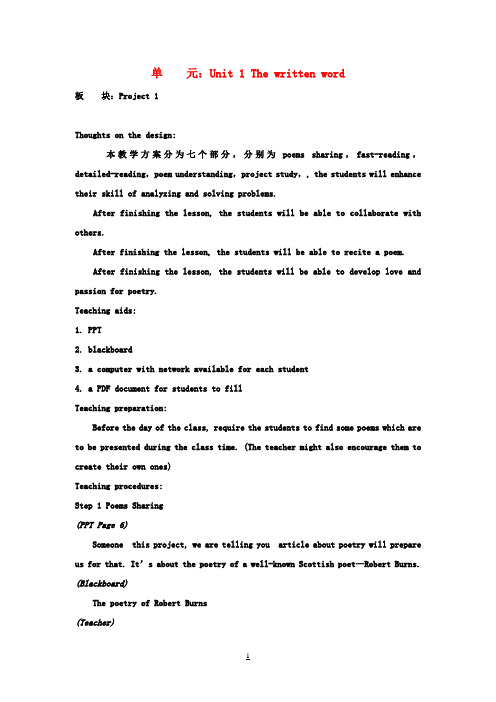
单元:Unit 1 The written word板块:Project 1Thoughts on the design:本教学方案分为七个部分,分别为poems sharing,fast-reading,detailed-reading,poem understanding,project study,, the students will enhance their skill of analyzing and solving problems.After finishing the lesson, the students will be able to collaborate with others.After finishing the lesson, the students will be able to recite a poem.After finishing the lesson, the students will be able to develop love and passion for poetry.Teaching aids:1. PPT2. blackboard3. a computer with network available for each student4. a PDF document for students to fillTeaching preparation:Before the day of the class, require the students to find some poems which are to be presented during the class time. (The teacher might also encourage them to create their own ones)Teaching procedures:Step 1 Poems Sharing(PPT Page 6)Someone this project, we are telling you article about poetry will prepare us for that. It’s about the poetry of a well-known Scottish poet—Robert Burns. (Blackboard)The poetry of Robert Burns(Teacher)So ]Poems sharing环节将发挥学生参与的主观能动性并在此基础上明确本课的学习方向。
Unit 1《The written word》-Task教案1(牛津译林版选修8)
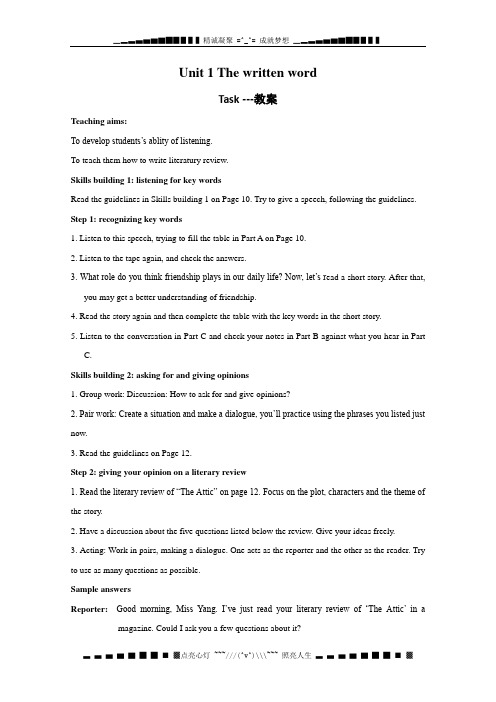
Unit 1 The written wordTask ---教案Teaching aims:To develop students’s ablity of listening.To teach them how to write literatury review.Skills building 1: listening for key wordsRead the guidelines in Skills building 1 on Page 10. Try to give a speech, following the guidelines. Step 1: recognizing key words1. Listen to this speech, trying to fill the table in Part A on Page 10.2. Listen to the tape again, and check the answers.3. What role do you think friendship plays in our daily life? Now, let’s r ead a short story. After that,you may get a better understanding of friendship.4. Read the story again and then complete the table with the key words in the short story.5. Listen to the conversation in Part C and check your notes in Part B against what you hear in PartC.Skills building 2: asking for and giving opinions1. Group work: Discussion: How to ask for and give opinions?2. Pair work: Create a situation and make a dialogue, you’ll practice using the phrases you listed just now.3. Read the guidelines on Page 12.Step 2: giving your opinion on a literary review1. Read the literary review of “The Attic” on page 12. Focus on the plot, characters and the theme of the story.2. Have a discussion about the five questions listed below the review. Give your ideas freely.3. Acting: Work in pairs, making a dialogue. One acts as the reporter and the other as the reader. Try to use as many questions as possible.Sample answersReporter:Good morning, Miss Yang. I’ve just read your literary review of ‘The Attic’ in a magazine. Could I ask you a few questions about it?Reader: Sure. What would you like to know about?Reporter:Do you think the plot of ‘The Attic’ sounds interesting?Reader: Yes, it is really entertaining and poetic from beginning to end.Reporter:People say the author uses colours to describe Cindy’s mood. What do you think of this way of writing?Reader:I like the way. In my eyes, colours add beauty to theReporter:Well, why do you think Virginia Fox uses chocolate as a symbol of happiness? Reader: I feel that chocolate usually helps us think of a sweet and rich life, which symbolizes happiness and success in Cindy’s life.Reporter:Personally I feel the same way. Bythe way, which character do you think is the most interesting in the story?Reader:If you ask me, I would say my favourite character is definitely Stuart, the ‘prince’. Reporter: Can you tell me why?Reader:Because I feel that he adds some comedy to this otherwise dark tale. Reporter:Do you think ‘the beauty of freedom’ is a good theme for a short story? Reader:Yes, it is an important theme in ‘The Attic’, which makes it different from other Cinderella stories. Reporter:Thank you very much.Skills building 3: writing a literary review1. Read the guidelines at the top of page 13. Remember what should be included in a review.2. Work in groups of four to write an outline of a literary review.Step 3: writing your reviewYou are expected to write a literary review of “The home-made ball” based on the information you have collected in Steps 1 and 2 and through this to practice the skills you have learnt in Skills buildings 1, 2 and 3.1. Review the information you have collected and the main points you need to include in writing a review.2. Work in groups of four to write the review.Possible example‘The home-made ball’ is a short story written by jerry Johnson.The story is set in modern-day America.The main character of ‘The home-made ball’ is a boy calledKevin. Kevin and Mike are good friends who play soccer with heir home-made ball every day, but when Kevin gets new sneakersand a soccer ball, things change.Friendship is an important theme in this short story. The author, Jerry Johnson, uses the old and new things, like the old home-made ball and the new soccer ball, and the old bench and the new sneakers As symbols. The old things symbolize the most valuable thing,friendship, which needs to be cherished.I think this story is really good and I give it a rating of four out of five.。
2021年高中英语 Unit 1 The written world教案 牛津译林版选修8
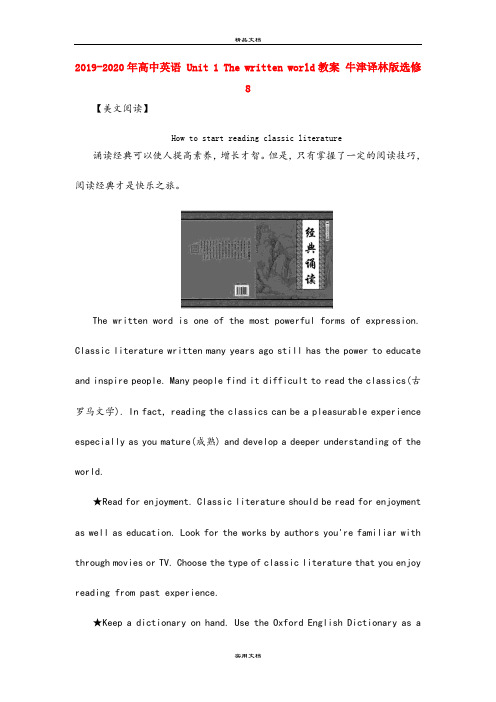
2019-2020年高中英语 Unit 1 The written world教案牛津译林版选修8【美文阅读】How to start reading classic literature诵读经典可以使人提高素养,增长才智。
但是,只有掌握了一定的阅读技巧,阅读经典才是快乐之旅。
The written word is one of the most powerful forms of expression. Classic literature written many years ago still has the power to educate and inspire people. Many people find it difficult to read the classics(古罗马文学). In fact, reading the classics can be a pleasurable experience especially as you mature(成熟) and develop a deeper understanding of the world.★Read for enjoyment. Classic literature should be read for enjoyment as well as education. Look for the works by authors you're familiar with through movies or TV. Choose the type of classic literature that you enjoy reading from past experience.★Keep a dictionary on hand. Use the Oxford English Dictionary as areference for unfamiliar words or to define(使明确) words that have changed in meaning over time. Start slowly and work on reading 30 minutes a day to get into the habit.★Get to read its biographical information. This is because it relates to the setting of the story and author. To have a better understanding of the story, find out more about the time period in which a work was created and the background of its author.★Do research on the Internet. Large numbers of websites, like Bibliomania, provide information for the study and exploration of classical literature.★Understand story structure. Classic literature often contains plex plots and extensive character development. Focus on reading for the overall(总的,全体的) theme or the meaning of the story, and take notes to recognize the basic elements of the story.★Buy literature panions. Authoritative(权威的) works such as the Oxford panion to Classical Literature or the Norton Anthology of English Literature offer popular classic works of literature to get you started.★Understand the use of footnotes(脚注) in literature. Classic literature is often full of references to social and culture elements ofthe past. Footnotes may be used to explain these references and make the material easier to understand.【诱思导学】1.Classic literature is too difficult for us to read now. Do you think so?2.Which tip do you think is the most useful while reading the classics?【答案】 1.Yes, I think so. / Though difficult, it can be read little by little.2.The last tip. Because I think footnotes are helpful to me.Period ⅠPreviewing(教师用书独具)●教学目标本课时主要是通过学生对学案所给出的内容的学习,了解本课文中所出现的生词,初步了解课文以及相关的背景知识,对课文的全面理解起到一个铺垫作用。
牛津译林版高中英语选修八Unit 1《The written word》(Task)教学设计1

牛津译林版高中英语选修八Unit 1《The writtenword》(Task)教学设计1板块:Task 1Thoughts on the design:本节课是以听和写为主的语言综合技能训练课,以学习写文学评论为话题,分两部分进行教学。
教师在教学中要给予学生充分的听和读的时刻。
关于课本上的如何听关键词的指导性的文字,要给学生明白得及热身的时刻;而关于如何做笔记、提炼要点,也可作一点温故知新的工作。
Teaching aims:In this part, students will learn to listen carefully for key words. Students will first learn some useful skills to li sten for key word s and then put them into practice to listen for key words in a talk about how to write a review. Then students will make notes for their review on their own and check answers through another listening activity.Teaching procedures:Step 1 Lead-inAsk students to read the instruction for skills building 1 and find out the key words to finish the follo wing summary.In order to _______________ about something, we often use key words, which are the most important words in a sentence or a paragraph.Key words are often ________, ________, or ___________ with a _______ before them.Answers:give useful hints; stressed; repeated; summariz ed; pauseNow, listen to me and take notes of key words in my speech.Just as a proverb says, ‘life is filled with twists and turns.’ One can’t gain any success if he or she never experiences difficulty and failure. In other words, trouble exists from beginning to end during our lifetime. Students may fail in their exams, scientists may fail in their experiments, and players may be defeated in their matches.Now, let’s read out the paragraph together and check our answers. [Explanation]本节课的导入,从阅读课本相关材料,找出关键词着手。
Unit 1《The written word》-Reading教案1(牛津译林版选修8)
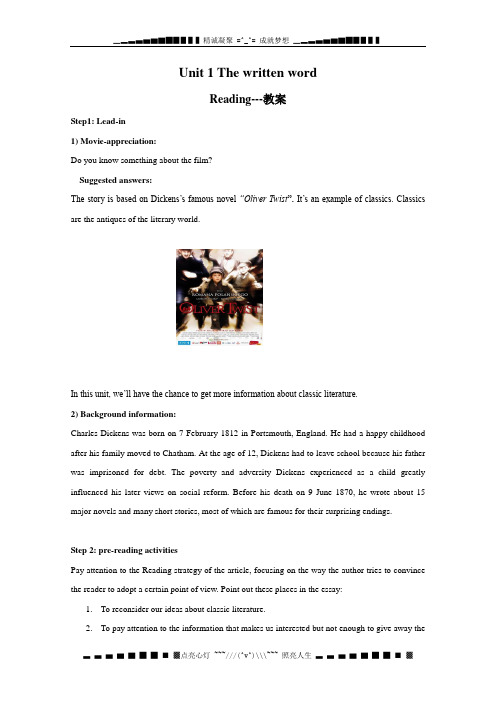
Unit 1 The written wordReading---教案Step1: Lead-in1) Movie-appreciation:Do you know something about the film?Suggested answers:The story is based on Dickens’s famous novel“Oliver Twist”.It’s an example of classics. Classics are the antiques of the literary world.In this unit, we’ll have the chance to get more information about classic literature.2) Background information:Charles Dickens was born on 7 February 1812 in Portsmouth, England. He had a happy childhood after his family moved to Chatham. At the age of 12, Dickens had to leave school because his father was imprisoned for debt. The poverty and adversity Dickens experienced as a child greatly influenced his later views on social reform. Before his death on 9 June 1870, he wrote about 15 major novels and many short stories, most of which are famous for their surprising endings.Step 2: pre-reading activitiesPay attention to the Reading strategy of the article, focusing on the way the author tries to convince the reader to adopt a certain point of view. Point out these places in the essay:1.To reconsider our ideas about classic literature.2.To pay attention to the information that makes us interested but not enough to give away thestory.Step 3: Fast reading1)With the read ing strategy above, let’s do our Reading. Read it quickly and try to grasp the main idea of the text and finish Part A on Page 2Go through the passage as quickly as possible and try to find answers to the three questions in part A on Page 2.Suggested answersA 1 Classics are the antiques of the literary world including novels, plays and poems that were written a long time ago and were well written and received.2 England’s greatest writer.3 Seven years old.Step 4: Detailed reading1) Second reading to complete Parts C1 , C2 and DSuggested answersC1 1 Because they think they are old-fashioned and boring, and have nothing to do with life today.2 She doesn’t think that they are old-fashioned or boring.3 Joe is a kind and simple man.4 On his gra vestone it reads, ‘By his death, one of England’s greatest writers is lost to theworld.’5 A stranger.6 Because he thinks Joe is not clever enough and far from being a well educated gentleman.7 He learns that wealth does not buy happiness and that friends are more important than a fancy education.8 An example of character development is the change in Pip from being concerned only with money to seeing that money is not the most important thing in life.C2 1 d 2 c 3 a 4 b 5 eD 1 c 2 d 3 e 4 a 5 g 6 f 7 h 8 b2) Finish part E as you are listening to the tape:AnswersE(1) authors (2) Pip(3) husband (4) England(5) symbol (6) novel(7) fortune (8) gentleman(9) shallow (10) themeStep 5: choose the best answers according to the text.1. Some people think that classics are old-fashioned because of the following statements except__________.A. they were written a long time ago.B. the language used in them is quite different from the language used today.C. they are difficult for people to understand.D. They can only be found in bookshops and libraries.2. Which of the following statements is wrong?A. Clueless, the award-wining film is based on Charles Dickens’s novel.B. The film based on Great Expectations was released in 1998.C. At first, Charles Dickens published many novels in newspaper.D. Good classics are examples of great writing and wisdom.3. When and where is Great Expectations set in?A. In the USA in the 1800s.B. In England in the early 1800s.C. In England in 1812..D. In the USA in 1870.Keys: D A BStep 6: Language points1) Useful expressionshave something to do with, have a place, in the world, be based on, be made into, at a time, on stage, be set in, have a kind word to sb., a symbol of, set sb. free, before long, be kind to, in the early 1800s,be bent on2) Sentence stuctures:1. They are novels, plays and poems that were written a long time ago and were so well written and well received that people still read them today.2. But Joe is a kind and simple man, who would rather die than see any harm come to Pip.3. Excited by his move to London, Pip can hardly wait to begin his new life.Step 7: Homework1.Read the review of the famous novel Les Miserables in part B on page 105 of the Workbook.2.According to what we learn this class and Homework 1, write a review about one of yourfavourite movies.3.Preview wordpower。
- 1、下载文档前请自行甄别文档内容的完整性,平台不提供额外的编辑、内容补充、找答案等附加服务。
- 2、"仅部分预览"的文档,不可在线预览部分如存在完整性等问题,可反馈申请退款(可完整预览的文档不适用该条件!)。
- 3、如文档侵犯您的权益,请联系客服反馈,我们会尽快为您处理(人工客服工作时间:9:00-18:30)。
牛津高中英语教学设计
单元:Unit 1 The written world
板块:Task 1
Thoughts on the design:
本节课是以听和写为主的语言综合技能训练课,以学习写文学评论为话题,分两部分进行教学。
教师在教学中要给予学生充分的听和读的时间。
对于课本上的如何听关键词的指导性的文字,要给学生理解及热身的时间;而对于如何做笔记、提炼要点,也可作一点温故知新的工作。
Teaching aims:
In this part, students will learn to listen carefully for key words. Students will first learn some useful skills to listen for key words and then put them into practice to listen for key words in a talk about how to write a review. Then students will make notes for their review on their own and check answers through another listening activity.
Teaching procedures:
Step 1 Lead-in
Ask students to read the instruction for skills building 1 and find out the key words to finish the following summary.
In order to _______________ about something, we often use key words, which are the most important words in a sentence or a paragraph.
Key words are often ________, ________, or ___________ with a _______ before them. Answers:
give useful hints; stressed; repeated; summarized; pause
Now, listen to me and take notes of key words in my speech.
Just as a proverb says, ‘life is filled with twists and turns.’ One can’t gain any success if he or she never experiences difficulty and failure. In other words, trouble exists from beginning to end during our lifetime. Students may fail in their exams, scientists may fail in their experiments, and players may be defeated in their matches.
Now, let’s read out the paragraph together and check our answers.
本节课的导入,从阅读课本相关材料,找出关键词着手。
在学生对如何在听的过程中,根据是否重读、是否重复等方法来确认关键词,有了初步认识后,进行一次小小的热身。
教师在朗读该段落时可以读一到两次,同时请一位同学上黑板记录关键词。
也可把该短文换为学生感兴趣的其它话题的小短文。
在听完后,以幻灯片的形式公布并校对答案。
有可能的话,可请同学齐声朗读一遍。
Step 2 Recognizing key words
Ask students to listen carefully and take notes of the key words.
Check answers after listening.
Answers:
author, title, category, setting;
plot, characters, character development;
themes, symbols;
personal opinion
该听力材料可让学生听一至两遍。
在核对答案时,可对category、symbol等词做一些必要的解释和举例。
提醒学生注意单词的正确拼写。
Step 3 Reading & Listening
Ask students to read the story The home-made ball on page 11 individually and then complete the table below with the key words in the short story.
Ask students to discuss answers in pairs or in groups.
Have students listen to the conversation in Part C and check their notes in Part B.
Check answers.
Answers:
The home-made ball;
Jerry Johnson;
short story;
Kevin, Mike, Steven;
Kevin and Mike are good friends and play soccer with their home-made ball every day. However, when Kevin gets new sneakers and a new soccer ball, things change;
friendship;
The old home-made soccer ball and the new soccer ball, the old bench and the new sneakers; okay;
该部分阅读要给学生充足的时间。
可在阅读前,提示学生复习如何做笔记。
Step 4 Words & Phrases
Ask students to read the story again and learn more about useful phrases in the way of translation.
1. 我们一看到他奇怪的衣服都笑了。
(at the sight of/catch sight of)
2. 不要把我丢了工作一事泄露出去,行吗? (let out)
3. 你什么时候买这个电脑的?它看上去还全新的呢。
(brand new)
Answers:
1. We all laughed at the sight of his strange clothes.
We all laughed when we caught sight of his strange clothes.
2. Don’t let it out about me losing the job, will you?
3. When did you buy this computer? It looks completely brand new.
该部分也可请学生在课本上勾画一些其它的重要短语或以听写的形式进行。
